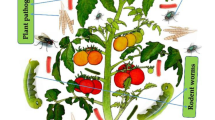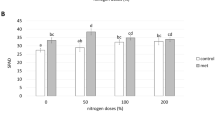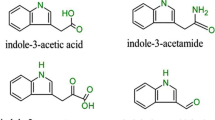Abstract
Rhizospheric bacteria possess the potential to colonize the root zone of plants and stimulate their growth through different mechanisms. The present study explored the competency of plant growth promoting rhizobacteria based bioformulations (bf) formed from Bacillus pumilus (BP-bf), Bacillus simplex (BS-bf) and Bacillus megaterium (BM-bf) on the growth, yield and nutrient status of two wheat genotypes (Raj 3765 and DBW 90). In vitro studies demonstrated that biopriming with bf significantly improves the vigor index and germination of seedlings whereas results varied with different bacterial bioformulations. A pot experiment for further validation of results was conducted in factorial design with these treatments: T1: control of DBW 90; T2: control of Raj 3765; T3: DBW 90 bioprimed with BP-bf; T4: Raj 3765 bioprimed with BP-bf; T5: DBW 90 bioprimed with BS-bf; T6: Raj 3765 bioprimed with BS-bf; T7: DBW 90 bioprimed with BM-bf; T8: Raj 3765 bioprimed with BM-bf. Results demonstrated that bf applied treatments exhibited significant (P ≤ 0.01) improved growth and yield over control. The grain yield ranged 3.48 to 6.61 g/pot in bf applied treatments and significantly (P ≤ 0.01) increased straw weight was also obtained in these treatments. Amongst all bioformulations, BM-bf triggered the highest growth and yields in both the wheat genotypes. Results also demonstrated that these bioformulations induced the nutrient uptake in both wheat genotypes. Wheat rhizospheric biological activity was also boosted by the application of these bioformulations as significantly (P ≤ 0.001) enhanced bacterial colonization and microbial enzymatic activities were found. The study advocates the ability of these plant growth promoting Bacillus based bioformulations to improve the growth, quality and productivity of different wheat genotypes.






Similar content being viewed by others
References
Abdul-Baki AA, Anderson JD (1973) Vigor determination in soybean seed by multiple criteria. Crop Sci 13:630–633
Akhila N, Kumari DA, Nayak MH, Vijaya D (2019) Impact of organic manures and biofertilizers on available NPK in soil and nutrient composition of okra Fruit. Int J Curr Microbiol App Sci 8(5):622–631
Akinrinlola RJ, Yuen GY, Drijber RA, Adesemoye AO (2018) Evaluation of Bacillus strains for plant growth promotion and predictability of efficacy by physiological traits. Int J Microbiol. https://doi.org/10.1155/2018/5686874
Anitha D, Vijaya T, Reddy NV, Pragathi NVD, Mouli K (2013) Microbial endophytes and their potential for improved bioremediation and biotransformation: a review. Indo Am J Pharmaceutical Res 3:6408–6417
Arora S, Singh YP, Vanza M, Sahni D (2016) Bio-remediation of saline and sodic soils through halophilic bacteria to enhance agricultural production. J Soil Water Conserv 15(4):302–305
Bhattacharyya PN, Jha DK (2012) Plant growth-promoting rhizobacteria (PGPR): emergence in agriculture. World J Microbiol Biotechnol 28:1327–1350
Borriss R (2011) Use of plant-associated Bacillus strains asBiofertilizers and Biocontrol agents in agriculture. DK Maheshwari Bacteria in agrobiology Plant growth responses. Springer Heidelberg, Dordrecht London, pp 41–76
Casida LEJ, Klein DA, Santoro T (1964) Soil dehydrogenase activity. Soil Sci 98:371–376
Chandra P, Chandra A (2016) Isolation and characterization of plant growth promoting bacteria from wheat-sugarcane cropping system. J Wheat Res 8(2):62–65
Chandra P, Chandra A (2017a) Elucidation of rRNA secondary structure and phylogenetic analysis of Salmonella enterica based on 16 s RNA. Int J Curr Microbiol Appl Sci 6(7):4056–4063
Chandra P, Chandra A (2017b) Identification and molecular characterization of Castellaniella ginsengisoli isolated from sugarcane-wheat cropping system. Int J Curr Microbiol Appl Sci 6(10):3509–3515
Chandra P, Tripathi P, Chandra A (2018) Isolation and molecular characterization of plant growth-promoting Bacillus spp. and their impact on sugarcane (Saccharum spp. hybrids) growth and tolerance towards drought stress. Acta Phy Plantarum 40:199
Chandra P, Dhuli P, Verma P, Singh A, Choudhary M, Prajapat K, Rai AK, Yadav RK (2020) Culturable microbial diversity in the rhizosphere of different biotypes under variable salinity. Trop Ecol 61:291–300
Chandra A, Chandra P, Tripathi P (2021a) Whole genome sequence insight of two plant growth-promoting bacteria (B. subtilis BS87 and B. megaterium BM89) isolated and characterized from sugarcane rhizosphere depicting better crop yield potentiality. Microbiol Res 247:126733
Chandra P, Wunnava A, Verma P, Chandra A, Sharma RK (2021b) Strategies to mitigate the adverse effect of drought stress on crop plants—influences of soil bacteria: a review. Pedosphere 31(3):496–509
Dereeper A, Guignon V, Blanc G, Audic S, Buffet S, Chevenet FFC, Dufayard JF, Guindon S, Lefort V, Lescot M, Claverie JM, Gascuel O (2008) Phylogeny. fr: robust phylogenetic analysis for the non-specialist. Nucleic Acids Res 36(suppl_2):W465–W469
Egamberdieva D, Wirth SJ, Alqarawi AA, Abd Allah EF, Hashem A (2017) Phytohormones and beneficial microbes: essential components for plants to balance stress and fitness. Front Microbiol 8:2104
FAO (2015) The State of Food Insecurity in the World: Meeting the 2015 International Hunger Targets: Taking Stock of Uneven Progress. FAO, Quebec
FAO (2017) FAOSTAT. Food Agriculture. Organization. United Nations. http://www.fao.org/faostat/en/#home
FAO (2018). FAOSTAT. Wheat Production Statistics. http://www.fao.org/faostat/en/#data/QC.
Goteti PK, Emmanuel LDA, Desai S, Shaik MHA (2013) Prospective zinc solubilizing bacteria for enhanced nutrient uptake and growth promotion in Maize (Zea mays L.). Int J Microbiol Article ID: 869697. https://doi.org/10.1155/2013/869697
Hashem A, Tabassum B, Allah EFA (2019) Bacillus subtilis: a plant-growth promoting rhizobacterium that also impacts biotic stress. Saudi J Biol Sci 26:1291–1297
Huang XF, Zhou D, Guo J, Manter DK, Reardon KF, Vivanco JM (2015) Bacillus spp. from rainforest soil promote plant growth under limited nitrogen conditions. J Appl Microbiol 118(3):672–84
Islam S, Akanda AM, Prova A, Islam MT, Hossain MM (2016) Isolation and identification of plant growth promoting rhizobacteria from cucumber rhizosphere and their effect on plant growth promotion and disease suppression. Front Microbiol 6:1360
Kalita M, Bharadwaz M, Dey T, Gogoi K, Dowarah P, Unni BG, Ozah D, Saikia I (2015) Developing novel bacterial based bioformulation having PGPR properties for enhanced production of agricultural crops. Indian J Exp Biol 53(1):56–60
Kamran S, Shahid I, Baig DN, Rizwan M, Malik KA, Mehnaz S (2018) Contribution of zinc solubilizing bacteria in growth promotion and zinc content of wheat. Front Microbiol 8:2593
Kang Y, Shen M, Wang H, Zhao Q (2013) A possible mechanism of action of plant growth-promoting rhizobacteria (PGPR) strain Bacillus pumilus WP8 via regulation of soil bacterial community structure. J Gen Appl Microbiol 59(4):267–277
Kumar A, Yadav DS (2001) Long-term effects of fertilizers on the soil fertility and productivity of a rice–wheat System. J Agron Crop Sci 186:47–54
Kumar DP, Anupama PD, Singh RK, Thenmozhi R, Nagasathya A, Thajuddin N, Paneerselvam A (2012a) Evaluation of extracellular lytic enzymes from indigenous Bacillus isolates. Int Res J Microbiol 3(2):060–065
Kumar P, Dubey RC, Maheshwari DK (2012b) Bacillus strains isolated from rhizosphere showed plant growth promoting and antagonistic activity against phytopathogens. Microbiol Res 167:493–499
Kundan R, Pant G, Jadon N, Agrawal PK (2015) Plant growth promoting rhizobacteria: mechanism and current prospective. J Biofertil Biopestici 6:155
Liang LZ, Zhao X, Yi XY, Chen ZC, Dong XY, Chen RF, Shen RF (2013) Excessive application of nitrogen and phosphorus fertilizers induces soil acidification and phosphorus enrichment during vegetable production in Yangtze River Delta, China. Soil Use Manag 29:161–168
Mahmood A, Turgay O, Farooq M, Hayat R (2016) Seed biopriming with plant growth promoting rhizobacteria: a review. FEMS Microbiol Ecol. https://doi.org/10.1093/femsec/fiw112
Naiji M, Souri MK (2018) Nutritional value and mineral concentrations of sweet basil under organic compared to chemical fertilization. J Hortorum Cultus 17(2):167175
Rai AK, Dinkar A, Basak N, Dixit AK, Das SK, Dev I, Sundha P, Chandra P, Kumar S (2021) Phosphorus nutrition of oats genotypes in acidic soils: Exploiting responsive plant-microbe partnership. Appl Soil Ecol 167:104094
Rana A, Kabi SR, Verma S, Adak A, Pal M, Shivay YS, Prasanna R, Nain L (2015) Prospecting plant growth promoting bacteria and cyanobacteria as options for enrichment of macro- and micronutrients in grains in rice–wheat cropping sequence. Cogent Food Agri 1:103–379
Reetha GAK, Pavani SL, Mohan S (2014) Hydrogen cyanide production ability by bacterial antagonist and their antibiotics inhibition potential on Macrophomina phaseolina (Tassi.). Int J Curr Microbiol App Sci 3(5):172–178
Sadiq HM, Jahangir GZ, Nasir IA, Iqtidar M, Iqbal M (2014) Isolation and characterization of phosphate solubilizing bacteria from rhizosphere soil. Biotech Biotech Equip 27:4248–4255
Schoebitz M, López MD, Serrí H, Martínez O, Zaga lE (2016) Combined application of microbial consortium and humic substances to improve the growth performance of blueberry seedlings. J Soil Sci Plant Nutr 16:1010–1023
Sheng XF, He LY (2006) Solubilization of potassium-bearing minerals by a wild-type strain of Bacillus edaphicus and its mutants and increased potassium uptake by wheat. Canadian J Microbiol 52(1):66–72
Souri MK (2010) Effectiveness of chloride compared to 3, 4dimethylpyrazole phosphate on nitrification inhibition in soil. Commun Soil Sci Plant Anal 41(14):1769–1778
Souri MK, Hatamian M (2019) Aminochelates in plant nutrition; a review. J Plant Nutr 42(1):67–78
Souri MK, Naiji M, Aslani M (2018) Effect of Fe-glycine aminochelate on pod quality and iron concentrations of bean (Phaseolus vulgaris L.) under lime soil conditions. Commun Soil Sci Plant Anal 49(2):215–224
Souza Rd, Ambrosini A, Passaglia LM (2015) Plant growth-promoting bacteria as inoculants in agricultural soils. Genet Mol Biol 38(4):401–419
Tabatabai MA, Bremner JM (1969) Use of p-Nitrophenyl phosphate for assay of soil phosphatase activity. Soil Biol Biochem 1:301–307
Tshikunde NM, Mashilo J, Shimelis H, Odindo A (2019) Agronomic and physiological traits, and associated Quantitative Trait Loci (QTL) affecting yield response in Wheat (Triticum aestivum L.): a review. Front Plant Sci 10:1428
Weisskopf L, Heller S, Eberl L (2011) Burkholderia species are major inhabitants of white lupin cluster roots. Appl Environ Microbiol 77:7715–7720
Yadav J, Verma JP, Tiwari KN (2010) Effect of plant growth promoting Rhizobacteria on seed germination and plant growth Chickpea (Cicer arietinum L.) under in vitro conditions. Biol Forum Int J 2(2):15–18
Yadav S, Modi P, Dave A, Vijapura A, Patel D, Patel M (2020) Effect of abiotic stress on crops. In: Hasanuzzaman M, Fujita M, Teixeira Filho MCM, Nogueira TAR, Galindo FS (eds) Sustainable crop production. Intech Open, London
Yang S (2006) Effect of long–term fertilization on soil productivity and nitrate accumulation in Gansu oasis. Agric Sci China 5:57–67
Zeffa DM, Perini LJ, Silva MB, de Sousa NV, Scapim CA, Oliveira ALMd, Amaral ATd Jr, Gonclaves LSA (2019) Azospirillum brasilense promotes increases in growth and nitrogen use efficiency of maize genotypes. PLoS One 14(4):0215332
Acknowledgements
Authors are thankful to the Director ICAR-Indian Institute of Wheat and Barley Research, Karnal, India for providing necessary facilities to carry out the research work.
Funding
The research work was funded by Indian Council of Agricultural Research at Indian Institute of Wheat and Barley Research, Karnal, Haryana, India.
Author information
Authors and Affiliations
Corresponding author
Ethics declarations
Conflict of interest
The authors declare that they have no conflict of interest.
Additional information
Communicated by M. J. Reigosa.
Publisher's Note
Springer Nature remains neutral with regard to jurisdictional claims in published maps and institutional affiliations.
Rights and permissions
About this article
Cite this article
Chandra, P., Khobra, R., Sundha, P. et al. Plant growth promoting Bacillus-based bio formulations improve wheat rhizosphere biological activity, nutrient uptake and growth of the plant. Acta Physiol Plant 43, 139 (2021). https://doi.org/10.1007/s11738-021-03310-5
Received:
Revised:
Accepted:
Published:
DOI: https://doi.org/10.1007/s11738-021-03310-5




